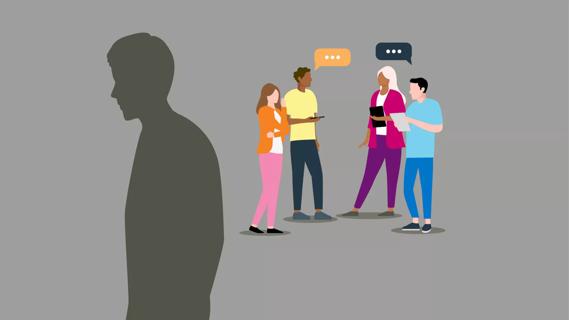Noticing what's right in the world can have a big impact on your life

Does negativity dominate your thinking? If the thoughts in your head about people, situations — and even yourself — are on the harsh side, you’re doing yourself a disservice. Here psychologist Scott Bea, PsyD, answers questions about why so many people struggle with negative thinking and explains how to adopt a more positive outlook on life.
Advertisement
Cleveland Clinic is a non-profit academic medical center. Advertising on our site helps support our mission. We do not endorse non-Cleveland Clinic products or services. Policy
A: Negative thinking makes you feel blue about the world, about yourself, about the future. It contributes to low self-worth. It makes you feel you’re not effective in the world.
Psychologists link negative thinking to depression, anxiety, chronic worry and obsessive-compulsive disorder (OCD). But almost all human beings contend with it — even those born with a positive outlook on life.
It’s because of the way our brains are constructed. Our amygdala and limbic system are built to notice threats, to protect our survival. In prehistoric times, it may have been a beautiful day on the savannah, but when we were stalked by a predator, we were trained to notice that danger.
Today, the same parts of our brain are active even when physical threats are minimal. The threats we deal with today are more cognitive — involving finances, whether we’re loved, whether we’re succeeding at work. They can set our hearts racing. That’s why we can panic on a Sunday night just thinking about work.
A: Absolutely. We practice worrying, and we get better at it over time. Worry is maintained by what we call ritualized reassurance. We think of all the negative scenarios that can possibly occur, and then all the ways we would survive them, to calm ourselves down.
Advertisement
But reassurance is a drug with a short half-life, like caffeine. If you use caffeine to combat fatigue, the more you use, the more fatigued you become over time. When people say, “The older I get, the more I worry,” it’s because they’ve been practicing.
And while we work out thousands of scenarios, the story is still only going to unfold in one way. It’s estimated that approximately 94% of the time, what we worry about doesn’t happen. What does happen is usually something we’ve never worried about.
We’re also constantly dosed with negative thinking because the media primarily portrays negative events. They know we’re more drawn to what’s wrong than to what’s right.
A: Rather than change the way you think, I recommend changing your relationship to your thoughts. We have about 50,000 spontaneous thoughts, images and ideas every day. Whether they’re positive or negative, they intrude into our awareness. Those that are negative are more likely to capture our awareness, or become “sticky.”
I recommend learning to watch your thoughts, rather than engaging with them. Practicing mindfulness can take you away from the thinking experience. For example:
When you get distracted by a negative thought, notice something to engage with in the present. What are you seeing, smelling, hearing, tasting, feeling?
Mindfulness also helps us program in ourselves a sense of that which is right. We can systematically notice what’s going well in the present. We can notice something favorable about each person we encounter. Words of admiration help us notice the rightness of things.
We can keep a gratitude journal, looking for those events that did work out. Doing this right before we go to sleep is especially helpful.
A: Yes, we’re learning that when we change habits, we change brain circuitry. It’s hard to exchange bad habits for good ones because they exist deep within the brain.
But when new habits are formed, they tend to stick and become more automatic. We may resist an exercise program at first, but after a while it becomes automatic. In the same way, we can try to form new habits around how we relate to our thoughts.
That’s why, more and more, mindfulness is being used as a tool to treat problems like social anxiety, OCD and depression. Mindfulness helps us accept things as they are, rather than always being in fix-it mode.
A: Your thoughts affect the way you regard your life. Positive thinking fosters self-acceptance and self-efficacy.
Advertisement
Maybe you have a gift to give that makes the lives of those around you better. Praising others has such an impact. It creates delight. It makes us all feel better and function better, and makes the world a better place.
Practicing positivity can also guide you to a different way of working within your profession. If you’re a lawyer, for example, you may want to switch from an adversarial role to more of an advocacy role.
Developing positivity can even influence the ways we choose to behave, leading us to feel better and to experience better outcomes in our lives.
Advertisement
Learn more about our editorial process.
Advertisement

Here's how you can address feeling overwhelmed or distressed in social situations

How to change how you respond when it rears its ugly head

Talk to a pediatrician if fears are constant, unreasonable

Why anxious feelings seem to come out of the blue

Connecting with others, going for a walk or focusing on sleep quality can help more than you might realize

Like being your own best friend in times of trouble, self-love is an act of self-preservation

It’s not about embracing your dark side — it’s about showing up for yourself

Like a boring ol’ grey rock, the goal is to be unresponsive and uninteresting to dissuade a harmful situation

Type 2 diabetes isn’t inevitable with these dietary changes

Applying a hot or cold compress can help with pain